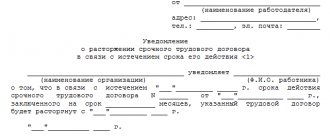As a rule, civil contracts are terminated by agreement of the parties. This can happen in the event of a violation of the contract, which entails such damage for its party that it is largely deprived of what it had the right to count on when concluding the contract (Article 450 of the Civil Code of the Russian Federation). Also, the counterparty has the right to refuse obligations if the circumstances of the agreement change so much that, if the parties could have reasonably foreseen this, the agreement would not have been concluded by them at all or would have been concluded on significantly different terms.
If the parties have not reached an agreement to bring the contract into compliance with the changed circumstances, the contract may be terminated by a court decision. A demand for termination of a contract can be submitted by a party to the court only after receiving a refusal from the other party to the proposal to terminate the contract or failure to receive a response within the time period specified in this proposal, and in its absence, within 30 days (Article 452 of the Civil Code of the Russian Federation).
General provisions on termination of the contract
The parties have the right to provide in the contract the possibility of unilateral refusal from it (clause 2 of Article 450 of the Civil Code of the Russian Federation). But nevertheless, from the established judicial practice we can conclude that for a unilateral refusal to fulfill a contract related to the implementation of entrepreneurial activities by its parties, the very fact of indicating in the law the possibility of such a refusal is sufficient (Resolution of the Presidium of the Supreme Arbitration Court of the Russian Federation dated 09.09.2008 No. 5782/08 ).
However, in order to minimize possible disagreements, the contract should establish the grounds and conditions for withdrawal from the contract. The agreement should also provide for the procedure for unilateral refusal or modification. The text of the agreement must indicate that the party wishing to terminate the agreement must send to the counterparty a notice of refusal to fulfill the terms of the agreement unilaterally. If necessary, the parties can fix the method (for example, a valuable letter with a list of attachments, telegraphic message, courier) and the timing of sending such a notification (clause 4 of Article 421 of the Civil Code of the Russian Federation). From the moment the notification is received, the contract is considered modified or terminated, unless otherwise provided by this notification.
note
A message is considered delivered to the addressee even if it was not actually received for reasons depending on the addressee (clause 1 of Article 165.1 of the Civil Code of the Russian Federation).
Thus, the contract may be recognized as amended or terminated even if the party did not receive the notice if the reason was, for example, the absence of a person authorized to receive correspondence at the address specified in the contract.
If the agreement does not provide the addresses of the parties for sending notifications, then the address specified in the Unified State Register of Legal Entities can be used. Such an address is reflected in the Unified State Register of Legal Entities for the purpose of communicating with a legal entity (subparagraph “c”, paragraph 1, article 5 of the Federal Law of 08.08.2001 No. 129-FZ “On State Registration of Legal Entities and Individual Entrepreneurs”). If a party does not take measures to receive correspondence at this address, it will not be able to further refer to the fact that the notification was not received by it, and, as a result, claim that the agreement has not changed or that its validity has not terminated (clause 1 of the resolution Plenum of the Supreme Arbitration Court of the Russian Federation dated July 30, 2013 No. 61 “On some issues in the practice of considering disputes related to the accuracy of the address of a legal entity”). The organization bears the risk of the consequences of failure to receive legally significant messages that were received at its address indicated in the Unified State Register of Legal Entities, as well as the risk of the absence of its representative at this address.
Transactions between counterparties involve various issues of cooperation. In this regard, depending on the content of the transaction, the appropriate type of contract is concluded. The grounds for unilateral refusal to fulfill various civil obligations (under supply, lease, paid ]contract[/anchor] contracts) have their own characteristics.
How to send it to the performer
The request should be sent to the counterparty in a way that will later confirm receipt of the request:
- hand over personally to the representative of the counterparty, in this case, on a second, identical copy, which remains with the applicant, obtain the signature of the accepting representative as confirmation of the transfer of the application;
- send by registered mail with return receipt requested;
- use the electronic document management system, if it is provided for in the agreement and allows you to confirm the fact of sending and receiving requests between counterparties.
Unilateral refusal to fulfill the supply agreement
Under a supply agreement, the supplier undertakes to transfer the ownership of the goods to the buyer, who undertakes to accept the goods and pay a certain amount of money for them. If the parties fail to fulfill their obligations, there are risks of causing economic damage and damage to business reputation. Failure to fulfill the terms of the contract is possible due to objective reasons without the fault of any of the parties. But, if one of them makes a decision to terminate the contract unilaterally, it must have a legal basis.
On a note
The supply agreement can be terminated by the seller if the goods must be transferred in assortment, and the agreement does not establish the procedure for determining it (clause 2 of Article 467 of the Civil Code of the Russian Federation).
The grounds for termination of the contract by the buyer may be: delivery of goods of inadequate quality with defects that cannot be eliminated within a time acceptable to the buyer, as well as repeated violations of delivery deadlines.
The supplier, in turn, can terminate the contract if the buyer repeatedly violates payment terms and does not select goods (Article 523 of the Civil Code of the Russian Federation).
These conditions for termination of the contract by the parties are established by Article 523 of the Civil Code as significant violations of agreements, and their list is closed. Because of this, it can be assumed that if the parties include clauses in the contract providing for their right to refuse to fulfill its terms on other grounds, then they will not be able to exercise such a right.
However, there is another rule: the reference in paragraphs 1 and 3 of Article 523 of the Civil Code to paragraph 4 of paragraph 2 of Article 450 allows for unilateral refusal of the contract in the event of another significant violation. As the courts indicate, this norm is a reference one, and this indicates that the list of cases of significant violation of the supply contract by its parties, which is contained in paragraphs 2 and 3 of Article 523 of the Civil Code, is not exhaustive.
This is the position of the courts. For example, a one-time delivery of goods was agreed upon between the parties. Long-term failure to fulfill this obligation on the part of the supplier indicates a significant violation of the contract and gives the buyer the right to refuse to fulfill its terms due to loss of interest in this product (resolution of the Federal Antimonopoly Service of the Volga-Vyatka District dated August 30, 2011 in case No. A17-5614/2010, FAS Far Eastern District dated October 29, 2013 No. F03-4835/2013 in case No. A73-15799/2012).
An important condition of the supply contract is a clear agreement on what to supply. And in practice, disputes arise about the sufficiency of determining the range of goods supplied.
A provision regarding the assortment of goods can be considered essential for a supply contract only if the parties have stipulated this in the contract itself or in appendices to it, for example, in a specification. This position has been repeatedly confirmed by judicial practice (decrees of the Federal Antimonopoly Service of the Central District dated April 24, 2008 No. F10-1641/08 in case No. A23-1982/07G-15-184, dated December 19, 2007 in case No. A09-9224/06-4, dated 12/21/2007 in case No. A09-9223/06-9; dated 06/25/2008 in case No. A23-2233/07G-4-59; resolution of the FAS of the East Siberian District dated 08/26/2010 in case No. A33-19037/2009) .
note
In case of receiving an advance payment and refusal to fulfill the terms of the contract for any reason, it is important to take into account that a necessary condition for the seller to accept for deduction of VAT accrued on the advance received is its return to the buyer (letter of the Ministry of Finance of Russia dated April 1, 2014 No. 03-07- RZ/14444).
One of the reasons for termination of the contract may be the buyer’s failure to make advance payment. In this case, the supplier may refuse to fulfill the obligation to supply goods and demand compensation for losses (clause 2 of Article 328 of the Civil Code of the Russian Federation).
So, it is possible to terminate a supply agreement unilaterally only in cases permitted by law. Possible economic losses in the event of an unwanted unilateral refusal of obligations encourage the parties to invent intricacies of interpretation of the terms of the contract. In particular, they include clauses in the agreement prohibiting its unilateral termination. But such a condition will contradict the essence of the delivery obligations; it is considered invalid and cannot be fulfilled by the parties (Article 168 of the Civil Code of the Russian Federation).
Explanations on the topic
| Main points | Document details | Document |
| If the FAS, when it considers the issue of including the supplier in the RNP, does not find grounds for unilateral termination of the contract, then this will become the basis for initiating a case for an administrative offense, which is provided for in Part 6 of Art. 7.32 Code of Administrative Offenses | Letter of the Federal Antimonopoly Service No. IA/18794/19 dated March 12, 2019 | |
| Refuse to perform if there are significant violations of the terms | Letter of the Ministry of Economic Development No. D28i-880 dated 04/08/2016 | |
| The supplier must comply with the requirements at the time of application. That is, if the supplier was not in the RNP at the time of filing the application, but during the period of concluding the government contract or during its execution he got into it, it cannot be terminated | Letter of the Federal Antimonopoly Service No. ATs/40483/15 dated 08/06/2015 |
About the author of this article
Dmitry Sidaev Higher and specialized education in procurement: KhSUEP, diploma with honors in the specialty “Jurisprudence” and GAPM named after. N.P. Pastukhova, diploma with honors in the program “Procurement Management”. Author and ideological inspirer of the projects “GoodWin Project: Tenders made simple” and “Antidote 44-FZ: a cure for headaches in procurement.” Trains in procurement under 44-FZ, advises suppliers and customers, works as a guest manager of the tender department. Invited expert in many projects on public procurement.
Other publications by the author
- 2021.10.13News and changesFeatures of changes in prices for construction government contracts will be extended to geological exploration purchases
- 2021.10.06EISInstructions for unilateral refusal to execute a government contract: as amended in 2022
- 2021.09.30 Procurement control Is it possible to change the essential terms of a government contract: changes from 2022
- 2021.09.29223-FZInstructions for canceling purchases under 44-FZ or 223-FZ: what will change in 2022
Unilateral refusal to execute the lease agreement
As stated in the Civil Code, under a lease agreement, the lessor undertakes to provide the tenant with property for a fee for temporary possession and (or) use.
In this case, at the request of one of the parties, the agreement may be terminated early by the court.
The landlord may require this if the tenant:
- uses the property in significant violation of the terms of the contract or the purpose of the property;
- significantly deteriorates the property;
- fails to pay rent more than two times in a row after the expiration of the payment period established by the contract;
- does not carry out major repairs of the property within the time period established by the lease agreement, or when this is the responsibility of the tenant, provided for by law in other cases.
The lessor has the right to demand early termination of the contract only after sending the tenant a written warning about the need to fulfill his obligation within a reasonable time (Article 619 of the Tax Code of the Russian Federation).
In turn, the tenant may terminate the contract early by the court in cases where:
- the lessor does not provide the property for use by the lessee or creates obstacles to this in accordance with the terms of the agreement or the purpose of the property;
- the property transferred to the tenant has defects that prevent its use, which were not specified by the lessor when concluding the contract, were not known to the tenant in advance and should not have been discovered by the tenant during an inspection of the property or checking its serviceability when concluding the contract;
- the lessor does not carry out major repairs of the property, which is his responsibility, within the time period established by the lease agreement, or, if they are not included in the agreement, within a reasonable time period;
- Due to circumstances for which the tenant is not responsible, the property will be in a condition unsuitable for use.
In practice, very interesting developments are possible when the lease agreement is terminated.
Example
An agreement was concluded between the Pension Fund Administration (tenant) and an entrepreneur (lessor) to provide non-residential premises for temporary use. In connection with the opportunity to improve the working conditions of the team, the fund sent the entrepreneur a notice of termination of the contract before its expiration date. Subsequently, the tenant sent the landlord an agreement to terminate the lease, and then two copies of the act of transfer of the premises and property located in it. In response to these letters, the entrepreneur informed the fund that there were no conditions in the lease agreement providing for the tenant's right to unilaterally refuse to fulfill it. Thus, the landlord refused to terminate the lease agreement because he considered it still valid. To this end, the fund sent the entrepreneur a certificate of acceptance of non-residential premises and the keys to the front door of the building by a valuable parcel post, informing him that he would vacate the premises occupied under the lease agreement from a certain date. The entrepreneur appealed to the arbitration court with a demand to collect rent for the entire period provided for in the contract, and not until the date of the fund’s actual departure from the building. The appellate court recovered the rent arrears from the Pension Fund Administration, recognizing the lease agreement as valid and indicating that the actual early vacancy of the disputed premises by the tenant is not grounds for terminating his obligation to pay rent (determined by the Supreme Arbitration Court of the Russian Federation dated July 31, 2013 No. VAS-9513 /13 in case No. A04-6503/2012).
As can be seen from the example, the tenant, it would seem, did everything right - sent a notice of termination of the contract, warned (repeatedly even) the landlord of his intention to vacate the premises and thereby terminate mutual contractual obligations. But, as it turned out, he had no legal grounds for this.
Such controversial situations are not uncommon, which once again emphasizes the importance of understanding the essence of contractual relations, one’s rights in their implementation, or unilateral refusal of this burden.
The obligations of the parties under the lease agreement for buildings, structures and premises registered with government agencies terminate from the moment of refusal to fulfill its terms. The agreement is considered terminated regardless of whether state registration of the termination of such a lease agreement has been carried out or not. The preservation of a lease agreement in the Unified State Register of Rights does not mean that it has not ceased to be valid (clause 6 of the resolution of the Plenum of the Supreme Arbitration Court dated November 17, 2011 No. 73).
An interested party to a terminated contract has the right to unilaterally apply to the body that registered the contract with a demand to cancel the record of its registration. The authority’s refusal to cancel the relevant record citing the absence of a statement from the second party does not comply with the law and can be challenged in court. In this case, all expenses that the person has incurred or will be forced to incur in connection with the illegal refusal, as well as his lost profits, are subject to recovery from the registering authority (clause 7 of the draft Plenum of the Supreme Arbitration Court of the Russian Federation “On the consequences of termination of the contract”).
In the event of termination of the lease agreement, payments for the use of the property are subject to collection until the day of its actual return to the lessor. And the lessor has the right to demand the accrual of a penalty for late payment of payments on the day of their actual execution by the other party to the agreement (Article 622 of the Civil Code of the Russian Federation).
What does it mean to terminate a contract?
Terminate a contract - terminate its validity from a certain date. Everything that happened before this date remains in effect.
Example:
Olga prepares lunches for offices. The contract with Romashka LLC stipulates the period: from July 1 to December 31. The company moved to the other side of the city. The director of Romashka himself offered to sign an agreement to terminate the contract. The company did not have time to pay for August. Termination of the contract does not release her from the debt. The service has been provided, and Olga is waiting for payment for it.
Unilateral refusal to execute a contract for paid services
Under a contract for the provision of paid services, the contractor undertakes, on the instructions of the customer, to perform certain actions or carry out any activity, and the customer undertakes to pay for these services. The Civil Code provides for the rights of both the contractor and the customer to unilaterally refuse obligations under such an agreement. At the same time, the property consequences of such a refusal are established for the parties. In particular, the contractor has the right to refuse obligations under the contract only if the customer is fully compensated for losses (clause 2 of Article 782 of the Civil Code of the Russian Federation), and the condition for the customer’s refusal to fulfill obligations under the contract is payment to the contractor of the expenses actually incurred by him (clause 1 of Art. 782 of the Civil Code of the Russian Federation).
The customer’s refusal to fulfill the contract is possible both before the start of the service and during the provision of the service, but not after the service has been fully provided (Resolution of the Presidium of the Supreme Arbitration Court of the Russian Federation dated 09/07/2010 No. 2715/10 in case No. A64-7196/ 08-23, ruling of the Supreme Arbitration Court of the Russian Federation dated March 19, 2007 No. 2257/07 in case No. A53-4372/2006-C1-52).
The customer is not required to provide reasons for refusal to fulfill obligations. The reason for the unilateral refusal of the contract for the provision of paid services declared by the customer has no legal significance (resolution of the Federal Antimonopoly Service of the Volga Region dated November 17, 2011 in case No. A55-20641/201).
An agreement for the provision of paid services cannot establish restrictions on the right to unilaterally refuse to fulfill the agreement, including penalties for such refusal. This conclusion is confirmed by judicial practice (rulings of the Supreme Arbitration Court of the Russian Federation dated 05/21/2013 No. VAS-5767/13 in case No. A40-60948/2012-144-295, dated 04/03/2013 No. VAS-4080/13 in case No. A40-12828/12 -102-114).
At the same time, a contract for the provision of paid services may contain a condition on the need to warn the contractor about the refusal of the contract within a certain period and (or) on the responsibility of the customer for failure to fulfill this condition (resolution of the Federal Antimonopoly Service of the Volga District dated May 12, 2010 in case No. A57-20634/2009 ). Meanwhile, such terms of the contract do not limit the right to unilaterally refuse it and are the will of the parties, which does not contradict the current legislation (Articles 421, 422 of the Civil Code of the Russian Federation).
An agreement for the provision of paid services cannot establish restrictions on the right to unilaterally refuse to fulfill the agreement, including penalties for such refusal.
If a decision is made to terminate the contract, one of the parties should send a notice of this to the address. There is no approved form of notification, but we draw your attention to the fact that its content should not have any discrepancies.
For example, a claim containing an intention to terminate the contract and a demand to return the advance payment may be qualified by the court as a unilateral refusal of the customer from the contract for paid services (resolution of the Federal Antimonopoly Service of the Central District dated August 19, 2011 in case No. A14-9544/2010/309/15) . The letter may not contain a direct indication of the desire to terminate the contract, but, according to the court, the reflection in it of the demand for the return of the paid advance is the exercise of the right to unilateral refusal to execute it (resolution of the Federal Antimonopoly Service of the North Caucasus District dated August 22, 2011 in case No. A53 -5678/2010). And the unilateral refusal of the contract for the provision of services for a fee by the customer requires compensation to him for all expenses incurred in connection with the execution of the contract.
If the contractor has received an advance payment, then in the event of a unilateral refusal to fulfill the contract (by either party) and its non-repayment, the question of unjust enrichment of the contractor arises, since no services were provided to them. However, he may have incurred any costs associated with preparing to provide them. In this case, the contractor must return the advance payment minus such amounts. This position is supported by judicial practice (resolution of the Federal Antimonopoly Service of the North-Western District dated May 30, 2011 in case No. A21-6716/2010). And in case of unjust enrichment, interest may be charged on the unreturned amount of the prepayment for the use of other people's funds.
It should be noted that the condition of the contract, according to which if the customer refuses to fulfill the contract, the advance will not be returned to him, is void (resolution of the Presidium of the Supreme Arbitration Court of the Russian Federation dated 09/07/2010 No. 2715/10 in case No. A64-7196/08-23 ).
Why is it important to terminate a contract legally?
The agreement confirms the entrepreneur’s responsibility to the customer. He is obliged to complete repairs, prepare a student for the Unified State Exam or develop a website. The opportunity to pick up and quit a job without consequences is rare. Usually the customer suffers losses, which he has the right to return under Art. 393 and 393.1 of the Civil Code of the Russian Federation. If he goes to court, you will most likely lose.
An example of incorrect termination of a contract
Irina develops websites. She entered into a contract agreement with Dmitry. She estimated the entire work at 50,000 rubles and took an advance payment of 25,000 rubles. The deadline has passed, but there are no results. Irina ignores the letters, does not return the advance payment and does not even pay attention to the complaint.
Dmitry found another performer and paid him 75,000 rubles. I launched the website by the beginning of the business season, as planned. And then he went to the arbitration court.
As a result, Irina paid 147,000 rubles:
— 25,000 rubles — for an unpaid advance,
- 25,000 rubles - because the customer had to pay more to another contractor.
- 2000 rubles - for state duty.
— 95,000 — for the customer’s expenses for a lawyer.
Irina's reputation will also suffer. Customers will check it in services like Kontur.Focus or on the website of the arbitration court. They will discover that she deceived the client and will choose another contractor.
Case No. A50-28821/2017
Unilateral refusal to perform a contract
Under a contract, one party (contractor) undertakes to perform certain work on the instructions of the other party (customer) and deliver the result to the customer, and the customer undertakes to accept the result of the work and pay for it.
The customer may refuse to perform the contract and demand compensation for damages if the contractor does not begin to fulfill the work contract in a timely manner or performs the work so slowly that completing it on time becomes clearly impossible, and also if during the execution of the work it becomes obvious that it will not be completed properly, and the identified deficiencies will not be eliminated within the agreed period (clauses 2, 3 of Article 715 of the Civil Code of the Russian Federation).
If the need for additional work is identified, the customer may not agree to exceed the price of the work approximately determined by the contract and refuse the contract (Clause 5 of Article 709 of the Civil Code of the Russian Federation). The customer’s refusal to fulfill the contract is also possible when the work has already been completed, but the shortcomings in the result of the work have not been eliminated by the contractor or are significant and cannot be eliminated in principle (Article 723 of the Civil Code of the Russian Federation).
One of the reasons for termination of the contract by the customer is also the failure of the contractor to complete the work on time. Upon the occurrence of such an event, the contractor must return the unused advance in full or part thereof. The contractor should confirm partial completion of the work under the contract by submitting invoices for the transfer of project documentation, acts of acceptance of work performed, as well as evidence of the customer’s evasion from signing them. Otherwise, the unreturned prepayment amount will be recognized as unjust enrichment and interest will be charged on it (resolution of the Federal Antimonopoly Service of the Far Eastern District dated August 27, 2013 No. F03-3916/2013 in case No. A73-14664/2012, resolution of the Federal Antimonopoly Service of the Northwestern District dated August 15, 2013 in case No. A56-62667/2012, resolution of the Federal Antimonopoly Service of the Central District dated June 26, 2013 in case No. A36-3281/2012).
The customer may, at any time before delivery of the result of the work to him, refuse to fulfill the contract by paying the contractor part of the established price in proportion to the part of the work performed before receiving notice of the customer’s refusal to fulfill the contract. The customer is also obliged to compensate the contractor for losses caused by termination of the contract, within the difference between the prices for all work and those paid for work already completed (Article 717 of the Civil Code of the Russian Federation).
In the process of fulfilling contractual obligations, the contractor is obliged to immediately warn the customer and, until receiving instructions from him, to suspend work if the following are discovered:
- unsuitability or poor quality of the material, equipment, technical documentation provided by the customer or the item transferred for processing (processing);
- possible adverse consequences for the customer of following his instructions on the method of performing the work;
- other circumstances beyond the control of the contractor that threaten the suitability or durability of the results of the work performed or make it impossible to complete it on time.
If the customer, despite timely and reasonable warnings about such circumstances, does not take the necessary measures to eliminate the circumstances that threaten the execution of the work, the contractor has the right to refuse to perform the contract and demand compensation for losses caused by its termination (Article 716 of the Civil Code of the Russian Federation).
When obligations end
In a pre-trial procedure, the parties can establish that the obligations under the contract are changed or terminated not from the moment the agreement is concluded, but from a certain date or from the date of the occurrence of the event specified in it.
If the contract is amended or terminated in court, the obligations of the parties are considered changed or terminated from the moment the corresponding court decision enters into legal force. The parties do not have the right to establish another point (clause 3 of Article 453 of the Civil Code of the Russian Federation).
For your information
In case of unilateral refusal of the contract, the customer must pay the contractor the actual expenses incurred solely in connection with the provision of services to the customer (determination of the Supreme Arbitration Court of the Russian Federation dated December 24, 2013 No. VAS-17829/13 in case No. A56-38647/2012).
Thus, the expenses that the contractor may incur after the customer refuses to fulfill the contract are not compensated (resolution of the Federal Antimonopoly Service of the West Siberian District dated April 29, 2010 in case No. A46-23676/2009). Such expenses may represent costs arising after the customer’s refusal, and not be related to the subject of the contract - severance pay for dismissed employees, costs for removing the contractor’s property from the customer’s territory, and so on.
As a result of termination of the contract, the debtor’s obligation to perform actions that are the subject of the contract ceases (for example, to ship goods under a supply agreement, to perform work under a contract, to issue funds under a loan agreement, etc.). In this case, one of the parties, as a rule, suffers economic losses, which, by a court decision, the other party is obliged to compensate (clause 1 of Article 393 of the Civil Code of the Russian Federation). The penalty established in case of improper fulfillment of the agreed obligation is accrued until the date of termination of the contract.
To impose liability in the form of recovery of damages, it is necessary to prove a violation of a contractual obligation, the fact of causing losses and their amount, as well as a cause-and-effect relationship between the violation and the damage. Failure to prove one of these elements entails refusal to satisfy such claims.
Not to terminate, but to change
At the request of the interested party, the contract may not be terminated, but amended by the court, if the following conditions are simultaneously met:
- at the time of concluding the contract, the parties assumed that such a change in circumstances would not occur;
- the change in circumstances was caused by reasons that the interested party could not overcome after their occurrence with the degree of care and prudence that was required of it by the nature of the contract and the conditions of turnover;
- execution of the contract without changing its terms would so violate the relationship of property interests of the parties corresponding to the contract and would entail such damage for the interested party that it would largely lose what it had the right to count on when concluding the contract;
- It does not follow from business customs or the essence of the contract that the risk of changes in circumstances is borne by the interested party (Article 451 of the Civil Code of the Russian Federation).
In other words, amendment of the contract due to a significant change in circumstances is permitted by court decision in exceptional cases. In such cases, when termination of the contract is contrary to public interests or will entail damage for the parties that significantly exceeds the costs necessary to execute the contract on the terms changed by the court.
Ekaterina Egorova,
for the magazine "Practical Accounting"
Have a question?
“Practical Accounting” is an accounting journal that will simplify your work and help you keep your books without errors. Get a guaranteed expert answer to your questions, as well as full access to all materials >>
If you have a question, ask it here >>
When to go to court
Going to court is necessary when a controversial situation arises when one party does not fulfill its obligations and violates the rights of the other party, for example:
- the contractor refuses to return the advance payment made earlier;
- the contractor incurred costs, but the customer refuses to reimburse them.
To make your complaint to the court more convincing and help solve the problem, study court decisions on similar cases. The database of judicial practice in ConsultantPlus will help you find them (get free access to it by clicking on the link below). The database contains decisions of all Russian courts, and the search is as simple as in Yandex. Be sure to refer in the text of the appeal to those cases that the court decided “in your” favor.
to read.








